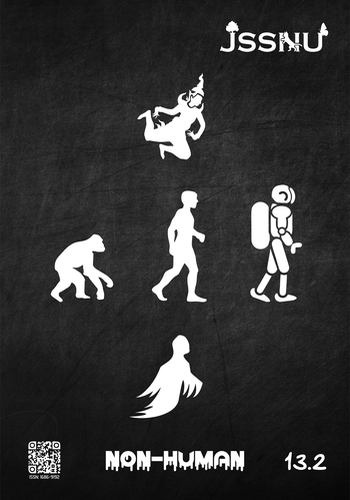Slavoj Žižek’s Development of the Inhuman/Posthuman: Film, Freedom, Capitalism
Main Article Content
Abstract
This article is interested in examining Slavoj Žižek’s developing idea on the inhuman which can be linked to the posthuman. This article starts with Žižek’s analysis of gaze and of voice without bodies, then moves to his discussion about the subject in cyberspace as multiplicity as ungraspable. It seems that such discussion is based on the idea of liberty to which Žižek finds that such thinking is problematic. He denies the thinking in which the subject is often misled to believe that they have a full liberty. Here, the discussion is moved to the posthuman, in which Žižek takes that the posthuman does not mean that the subject is emancipatory; the reality of life in which full freedom is negated has been continuing. The question raised by Žižek is that who is behind the success of this human beyond the limitation of being human? Perhaps the success that lurks behind the posthuman is the success of capitalism.
Downloads
Article Details
References
Lacan, Jacques. (2007). The Seminar of Jacques Lacan: The Other Side of Psychoanalysis. In Jacques-Alain Miller (Ed.) and Russell Grigg (Trans.). New York: W.W. Norton.
Lacan, Jacques. (1979). The Four Fundamental Concepts of Psycho-Analysis. In Jacques-Alain Miller (Ed.) and Alan Sheridan (Trans.). London: Penguin Books.
Slavoj Žižek on Artificial Intelligence, YouTube video, 11.07, posted by Pragmatic Entertainment, April 7, 2017. Retrieved October 24, 2017 from https://www.youtube.com/watch?v=ftI8IW_aItY.
Žižek, Slavoj. (1989). The Undergrowth of Enjoyment: How Popular Culture can Serve as an Introduction to Lacan. In Elizabeth Wright and Edmond Wright (Eds.). The Žižek Reader. MA. and Oxford: Blackwell Publishing.
Žižek, Slavoj. (1993). Tarrying with the Negative: Kant, Hegel, and the Critique of Ideology. Durham and NC: Duke University Press.
Žižek, Slavoj. (1994). The Metastases of Enjoyment: Six Essays on Women and Causality. London and New York: Verso.
Žižek, Slavoj. (1997). The Plague of Fantasies. London and New York: Verso.
Žižek, Slavoj (1999). Is it possible to Traverse the Fantasy in Cyberspace?. In Elizabeth Wright and Edmond Wright (Eds.). The Žižek Reader. MA. and Oxford: Blackwell Publishing.
Žižek, Slavoj. (2001). No sex, please, we’re Post-Human!. Retrieved October 24, 2017 from http://www.lacan.com/nosex.htm.
Žižek, Slavoj and Daly, Glyn. (2004). Conversations with Žižek. Cambridge: Polity Press.
Žižek, Slavoj. (2016). Disparities. London: Bloomsbury.


